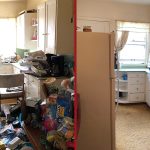What to Do When Your Family or Friend is a Hoarder
No one wants to see a family member or friend in trouble, and knowing they are can be difficult. People who suffer from Hoarding Disorder (HD) often don’t want to admit they have a problem, but family and friends see it because there’s no hiding hoarding – the evidence is all around them.
HD is characterized by several key components: the accumulation of possessions that are of no use or have limited value, living spaces that can’t be used as what they were designed for, due to too much clutter, and distress to the point of inaction when it comes to getting rid of the accumulated items. In severe cases, hoarders may not be able to use a stove or open a closet or the refrigerator because there is too much stuff on top or in front of it. Sometimes, when the house becomes too full the hoarder will start to use up other spaces, such as a garage, outbuilding, or the backyard.
As the items begin to accumulate it can be impossible to clean around them all. In some situations, people hoard animals as well as objects and due to the number of animals they are unable to take proper care of them. This can lead to a health hazard because animal feces can carry diseases. In areas that can’t be cleaned, rodents and pests can move in and be almost impossible to get rid of without professional help.
Never Help On Your Own
People suffering from HD can become very agitated when someone addresses the situation or wants to help. Some of them are unable to admit they have a problem to begin with, which means they can become angry at someone suggesting they have a problem. In some cases, they can associate items with old memories that comfort them, such as an old friend or beloved pet that has died. This makes parting with items even harder.
HD is often linked to other mental disorders such as obsessive-compulsive disorder (OCD), attention deficit hyperactivity disorder (ADHD), other anxiety disorders and even depression. Because HD is considered a mental illness, it’s important to understand you may have limited ability to help.
If you’re comfortable talking with the person, you can suggest they see a licensed psychologist or psychiatrist to discuss the problem. If they don’t agree or simply refuse and you believe their health or that of any pets is in jeopardy, you can contact your local authorities. The public health department is a great place to start as is an animal welfare agency when pets are involved. Law enforcement agencies, fire departments, child and elder protective services are also good resources.
Don’t Feel Bad but be Empathetic
A key to dealing with hoarders is to try and put yourself in their shoes. While they may not live the way you would, there is a reason for the situation they are in. Try to understand that this is their life and space and you need to focus on their safety and health- without being condescending or judgmental.
Safety and functionality are the goal, not a show home.
Even when you do make progress the end result may not be what you were expecting. Homes that have been hoarded for long periods of time can have major damage. For the hoarder, it is quite difficult to get rid of the clutter. If you are helping in this situation, ask yourself “Is my loved one safe?” “Is the home functional?” If so, you may have done all you need to do. This is not about getting the home to your standard of organization. Rather, making the home safe, functional and comfortable for the person who lives there.
If you do have to get professionals involved, remember that the hoarder may be angry with you at first. Let the professionals do their job but remain supportive. Once your friend or loved one begins dealing with their disorder, you can help them by contacting a biohazard cleanup company that will help to eliminate any trash or worthless items. They will help to sort out what is valuable monetarily and emotionally, and they are sensitive and caring towards the individual while addressing the excessive clutter.






